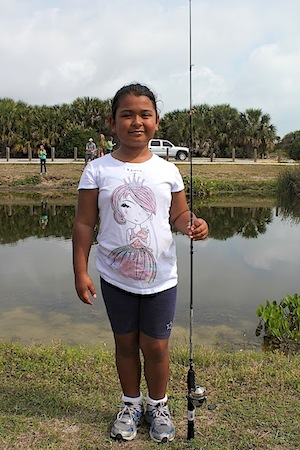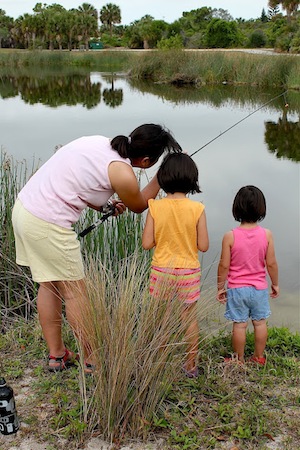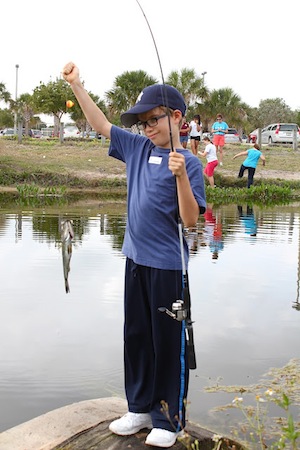All of a sudden, going fishing wasn't such an imposition.
- Tim McGraw, Live Like You Were Dying
Sofia. A tiny handful of a girl, maybe 6 or 7 years old, pleasantly plump with a blazing personality to match her vibrant eyes. She expertly slips a bit of hotdog on the tip of the hook as if she had been doing this her whole life rather than it being her first time. Feet firmly planted in the sandy grass, she flicks the rod forward and watches as the line flies, the hook dropping elegantly in the water, tiny swirls emanating from the landing spot. She waits patiently, talking to herself in one continuous stream of thought. Suddenly, a slight tug on the rod and a tautening of the string and she jumps to action. No girlish squeal, no yelp for help, Sofia simply reels the tiny fish in to the wonderment of her small brother and the excitement, albeit rather expectant (knowing her daughter as she does) excitement, of her mother.
I walk up behind Sofia as she turns in my direction, fingers busy with the squirming fish as she unhooks it to toss it back into the water - as per instructions - and I ask her why she has come here today, why she wanted to learn to fish. Eyes firmly on her business, Sofia in her blue shorts and pink and white princess tee, states ever-so matter of factly: "I want to cook a meal for my parents! They love fish so even though I don't like fish I want to cook it for them because it's their favorite thing. So I have to learn how to catch the fish I will cook." I am, needless to say, thoroughly impressed.
Sofia never mentioned the fish counter at the grocery store nor did the words fish fingers or breaded fish sticks pass her lips. Nope. By golly, the girl wanted to catch the fish she would eventually prepare for her parents. Here I was, surrounded by happy, chattering children, each with a rod and a reel in hand, a cup of bait at their ever-dancing feet, excited to be out under the Florida sun, along the water's edge, close to the earth and learning to fish on a bright, hot April Saturday morning. This is enough to renew my faith in the next generation. I am in awe.
This was a Hook Kids on Fishing event held at the park surrounding the public library in my hometown of Satellite Beach, Florida. Thirty or so kids, accompanied by either parents, grandparents or, as in the case of nine young ladies, a Girl Scout leader, have come to the park today to learn how to fish. Hook Kids on Fishing was the brainchild of Karen and Rod Smith, founders of Anglers For Conservation *, a group of anglers who set out to save the Indian River Lagoon, one of the most diverse estuaries in the world, and the marine life within. The group's aim - there are currently 15 chapters - is to teach others, whether young, old or in between, the ins and outs of fishing, create, instill and nurture a passion for angling, boating and other water-related activities and, from there, the outdoors in the hope of giving rise to an awareness of the delicate balance that is Mother Nature and the importance of conservation and living sustainably. Hook Kids on Fishing evolved as a way to introduce kids and, by extension, their families to the Indian River Lagoon. After all, hook a kid on fishing and at least one adult must accompany the child!
Teach by doing is how Anglers For Conservation works. Rather than sit folks in a room and harp on the rights and wrongs of the way we live, rather than force an opinion or a way of doing on the adamantly stubborn just by saying we know best, this group of passionate anglers understands that subtly imparting best practices through doing is the way that works. By creating an interest in angling and instilling the desire in people to get out and get fishing, bringing them in close contact with the water and the earth, AFC hopes to inspire people to evolve and grow their own awareness and knowledge and come to their own conclusion of the necessity of preserving the planet and how to reduce their impact on the environment. And this often starts with the children.
Hook Kids on Fishing is an outdoor classroom for children ages 6 to 16, yet today's group is notably the younger set and strikingly feminine! Dressed in typically Florida summer garb of flip flops, shorts and tee shirts or delightfully girly frills, spangles and sparkles, the participants grab a rod and reel and gather around the teachers, adults and professional guides and knowledgeable anglers (who) teach casting, fishing safety, knot tying, the tackle box, catch and release tactics, fishing habitat and conservation. Passing from station to station, eagerly tying gut on hooks, a delicate process for little fingers, obediently holding the rods in the correct upright position, standing body lengths apart as they study and practice the right method for casting, listening wide-eyed and attentively to boating safety tips, asking and answering questions about what pollutes and destroys the precious environment and what will not, the kids then file one by one in front of the bait table to collect paper cups with bits of bacon, shrimp pulp and hot dog (these are definitely not kosher fish!) and walk solemnly yet merrily to the edge of the lake to begin.
Kids are incredibly receptive to learning and ecology when put in the right mood and in the right setting. And when they are having serious fun. As the teachers and monitors weave in and out among the children, watching to make sure they hold their poles correctly, get the bait on the hooks and help the fidgety or hesitant ones to pull their catch off the hooks and place the wiggling fish back in the lake, the children concentrate, rows of serious faces turned towards the lake, on every detail. Some kids are in continual movement, bouncing from foot to foot, talking aloud non-stop to younger siblings or parents or whoever will listen, dashing from friend to friend or from parent to sister and back again. Some kids stand stockstill, afraid to move, caught up in the solemnity of the moment, of such an Herculean learning experience. They compare bait, analyzing whether the hot dog or the bacon attracts more fish; they hold aloft each and every catch, from the tiny 2-inch-long minnows to the whopping bass, each as exciting as the other, oohing and ahhing appreciatively over the other's catch.
I wander silently, discreetly among the children, snapping pictures, making every effort not to disturb or distract. Yet after half an hour of observation, it finally strikes me just how many of these young anglers, these eager students are girls. And I just had to understand why. I began with Sofia, whose answer - not the less accentuated by her very serious demeanor - thoroughly impressed me. From there I ask all the girls or their parents. One mother tells me that her young 6-year-old daughter had practically dragged her there, anxious to learn everything she could. The Girl Scout leader, pointing out her nine vivacious pre-teen charges, explains that her troop is largely made up of tomboys, the girls who love camping, climbing, hiking, sports, fishing, absolutely anything and everything outdoorsy and physical. And I speak to the parents of three young ladies, the oldest maybe 13 or so, the younger two closer to 7 or 8, who carefully explain that while boys are almost systematically invited to or brought to events such as this and are more often found fishing next to their dads, girls rarely are. And therefore they make it a point to involve their daughters in as many activities as possible, both traditionally feminine and masculine. And it was they who signed up the three for Hook Kids on Fishing. From the look of their daughters, each enthusiastic member of the family is loving every second of the day.
As I leave the youngsters behind, climbing in my car to head home, I wonder if Sofia will get that chance to cook a fish dinner for her parents and how it will turn out. And I wonder if Anglers For Conservation will next create a Hook Kids on Cooking Fish event. If they haven't thought about it yet, maybe they should.
I would like to thank the kind and generous folks of Anglers For Conservation * - Rod, Karen, James, Warren and Dom - who invited me to Hook Kids on Fishing for Fish Earth Day and who welcomed me, talked with me and impressed and inspired me. And I tip my hat to all the wonderful kids who I watched, met and spoke with on this day - with awe and respect. This one simple day showed me how enthusiastic children are to new experiences, how they can be pulled away from computers and televisions and brought outdoors with very little effort or coercion. This day showed me how curious children still are, how receptive they are to learning and caring about the environment when showed the ropes and given the chance. And the great people who make up Anglers For Conservation showed me that people do care and can indeed make a difference. One generation at a time.
* Anglers For Conservation is a non-profit organization whose goals are education, applied conservation and habitat restoration through an ongoing series of in-the-field, hands-on events and clinics, both short- and long-term. The group works within recreational fishing communities to create a new generation of marine stewards by establishing Marine Stewardship and Hook Kids on Fishing Programs. Please visit their website for more information about their activities as well as their work and see how you can get involved. It is a wealth of information.
Jamie Schler lives, eats and writes in France. To read more of her work visit Life's a Feast.





